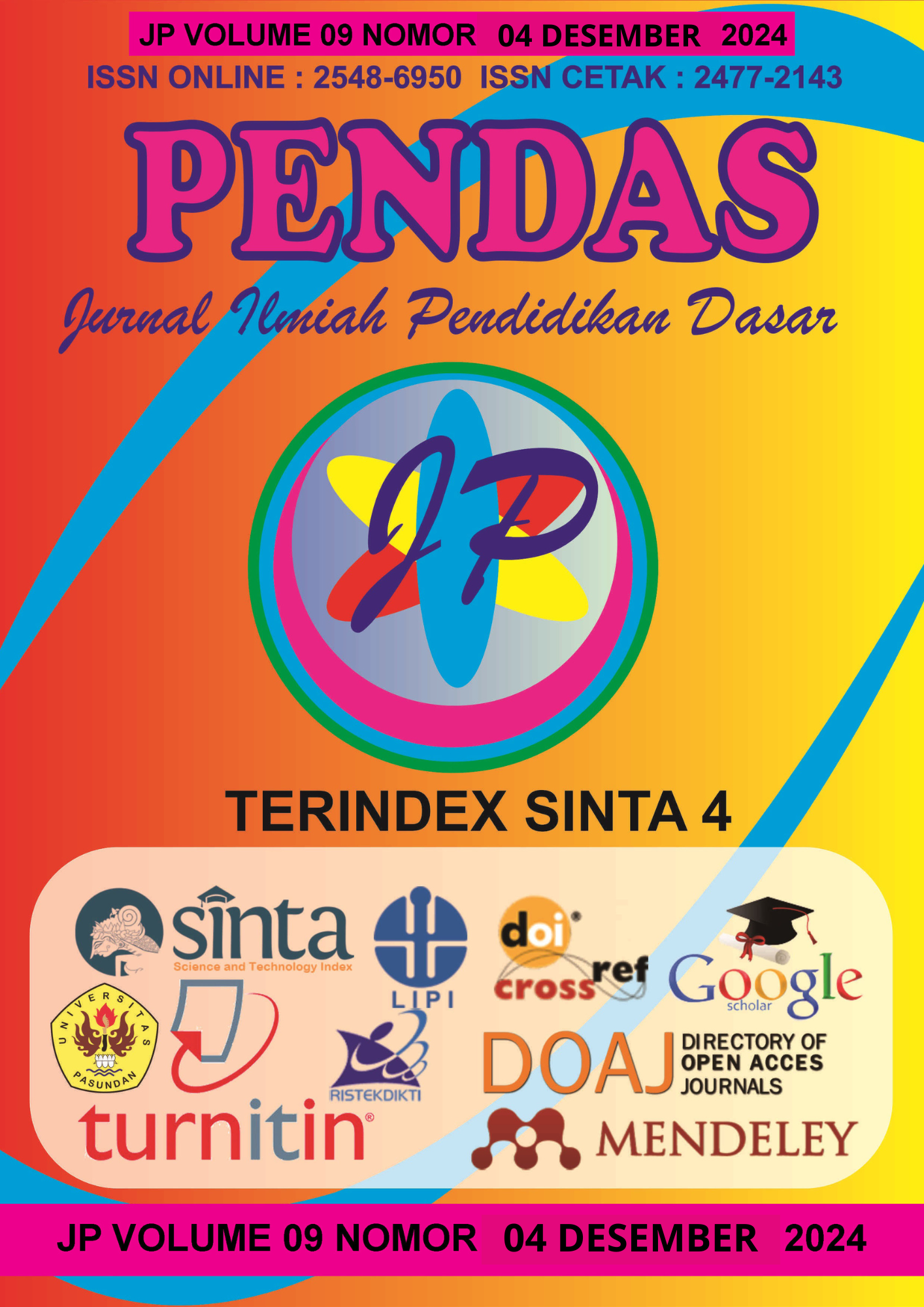ANALISIS PEMBENTUK EFIKASI DIRI PESERTA DIDIK DALAM PEMBELAJARAN MATEMATIKA SEKOLAH DASAR MELALUI FAKTOR EKSTERNAL
Keywords:
Math self-efficacy, Mathematics self efficacy, Self-efficacy, Mathematics education, Primary education, Efikasi diri matematika, Matematika sekolah dasarAbstract
Like a fish in the open sea, not just in an aquarium, which illustrates the researcher openness to the wider world. After the researcher finds an understanding of herself, then the researcher will relate to the outside world. The researcher reflects in depth on the transformation that exists in the researcher and explores how external factors in students can influence self-efficacy in learning elementary school mathematics. This research is a transformative qualitative type that uses the method of writing as inquiry, writing critical auto|ethnography to help researcher understand the experience of being student, student of university, and teacher. Researcher also used postmodern interviews to find out the views of students, teachers, and parents on the formation of students' self-efficacy in learning mathematics. The results of auto|ethnography studies, literature studies, and interviews show that there are external factors in the form of verbal persuasion from parents, teachers, and friends that influence students' self-efficacy in learning mathematics. The verbal persuasion that students receive comes from the people around them, who are the people closest to them; so the researcher chose to call it a closest person verbal persuasion. Through this research, researcher and research subjects can change the view that external factors in the form of verbal persuasion from people closest to them can shape students' self-efficacy in learning mathematics. Therefore, the formation of self-efficacy through external self learners can be well controlled by external parties. Controlling the formation of self-efficacy is intended so that students develop good self-efficacy in learning mathematics.
Keywords: external factors, self-efficacy, mathematic learning.
Downloads
References
Agus, I. (2021). Hubungan antara efikasi diri dan kemampuan berpikir kritis matematika siswa. Delta: Jurnal Ilmiah Pendidikan Matematika, 9(1), 1.
Akuba, S. F., Purnamasari, D., & Firdaus, R. (2020). Pengaruh Kemampuan Penalaran, Efikasi Diri dan Kemampuan Memecahkan Masalah Terhadap Penguasaan Konsep Matematika. JNPM (Jurnal Nasional Pendidikan Matematika), 4(1), 44–60.
Ananda, E. R., & Wandini, R. R. (2022). Analisis kemampuan literasi matematika siswa ditinjau dari self efficacy siswa. Jurnal Obsesi: Jurnal Pendidikan Anak Usia Dini, 6(5).
Bandura, A. (1977). Self-efficacy: toward a unifying theory of behavioral change. Psychological Review, 84(2), 191.
Bandura, A. (1997). Self-Efficacy The Exercise of Control. W.H. Freeman and Company.
Fan, W., & Williams, C. M. (2010). The effects of parental involvement on students’ academic self‐efficacy, engagement and intrinsic motivation. Educational Psychology, 30(1), 53–74.
Johnson, A. L. (2017). Exploration of factors affecting the self-efficacy of asynchronous online learners: a mixed methods study. Virginia Tech.
Laksmi, P. P. D., Suniasih, N. W., & Wiyasa, K. N. (2018). Pengaruh pola asuh orang tua terhadap efikasi diri siswa kelas V SD. Mimbar Ilmu, 23(1), 83–94.
Lam, Y. Y., & Chan, J. C. Y. (2017). Effects of social persuasion from parents and teachers on Chinese students’ self-efficacy: An exploratory study. Cambridge Journal of Education, 47(2), 155–165.
Li, Y., Whitcomb, K., & Singh, C. (2020). How perception of being recognized or not recognized by instructors as a “physics person” impacts male and female students’ self-efficacy and performance. The Physics Teacher, 58(7), 484–487.
Maimunah, S. (2020). Pengaruh dukungan sosial dan efikasi diri terhadap penyesuaian diri. Psikoborneo: Jurnal Ilmiah Psikologi, 8(2), 275–282.
Mariana, N. (2017). Transforming mathematics problems in Indonesian primary schools by embedding Islamic and Indonesian contexts. Murdoch University.
Mariana, N. (2018). Eksplorasi Nilai-nilai Pancasila untuk Mentransformasi Konteks dalam Pembelajaran Matematika di Sekolah Dasar. Jurnal Penelitian Pendidikan Guru Sekolah Dasar, 6(3).
Mariana, N. (2019). Transformation of research education at elementary school mathematics in the industry 4.0. Int. J. Innovation, Creativity Change, 5(5), 1–10.
Murtiningsih, E., & Mariana, N. (2021). Eksplorasi Konsep Geometri Pada Arsitektur Pintu Gerbang Majapahit Sebagai Peninggalan Sejarah Di Kabupaten Pati. 2016–2027.
Ningsih, W. F., & Hayati, I. R. (2020). Dampak Efikasi Diri Terhadap Proses & Hasil Belajar Matematika (The Impact Of Self-Efficacy On Mathematics Learning Processes and Outcomes). Journal on Teacher Education, 1(2), 26–32.
Nursalim, M., Laksmiwati, H., Budiani, M. S., Syafiq, M., Savira, S. I., Satwika, Y. W., & Khoirunnisa, R. N. (2019). Psikologi Pendidikan (P. Latifah (ed.); Pertama). PT Remaja Rosdakarya.
Purwanto, A. (2020). Studi eksplorasi dampak Work from Home (WFH) terhadap kinerja guru selama pandemi COVID-19. EduPsyCouns: Journal of Education, Psychology and Counseling, 2(1), 92–100.
Saadah, L., & Mariana, N. (2018). Studi Auto| etnografi: Kecemasan Guru Kelas Sekolah Dasar Saat Mengajarkan Matematika. Jurnal Penelitian Pendidikan Guru Sekolah Dasar, 6(7).
Srirahmawati, I. (2021). Peran Guru Sebagai Fasilitator dalam Mengasah Penalaran Matematika Siswa SDN 29 Dompu Tahun Pembelajaran 2020/2021. Ainara Journal (Jurnal Penelitian Dan PKM Bidang Ilmu Pendidikan), 2(2), 114–123.
Strecher, V. J., McEvoy DeVellis, B., Becker, M. H., & Rosenstock, I. M. (1986). The role of self-efficacy in achieving health behavior change. Health Education Quarterly, 13(1), 73–92.
Taylor, P. C. (2016). Transformative science education. Proceeding AISTEEL The First Annual International Seminar on Transformative Education and Educational Leadership, 1, 1–6.
Taylor, P. C., & Settlemaier, E. (2003). Critical autobiographical research for science educators. Journal of Science Education in Japan, 27(4), 233–244.
Taylor, P. C., Taylor, E., & Luitel, B. C. (2012). Multi-paradigmatic transformative research as/for teacher education: An integral perspective. Second International Handbook of Science Education, 373–387.
Zander, L., Brouwer, J., Jansen, E., Crayen, C., & Hannover, B. (2018). Academic self-efficacy, growth mindsets, and university students’ integration in academic and social support networks. Learning and Individual Differences, 62, 98–107.
Downloads
Published
Issue
Section
License
Copyright (c) 2025 Pendas : Jurnal Ilmiah Pendidikan Dasar

This work is licensed under a Creative Commons Attribution 4.0 International License.














































